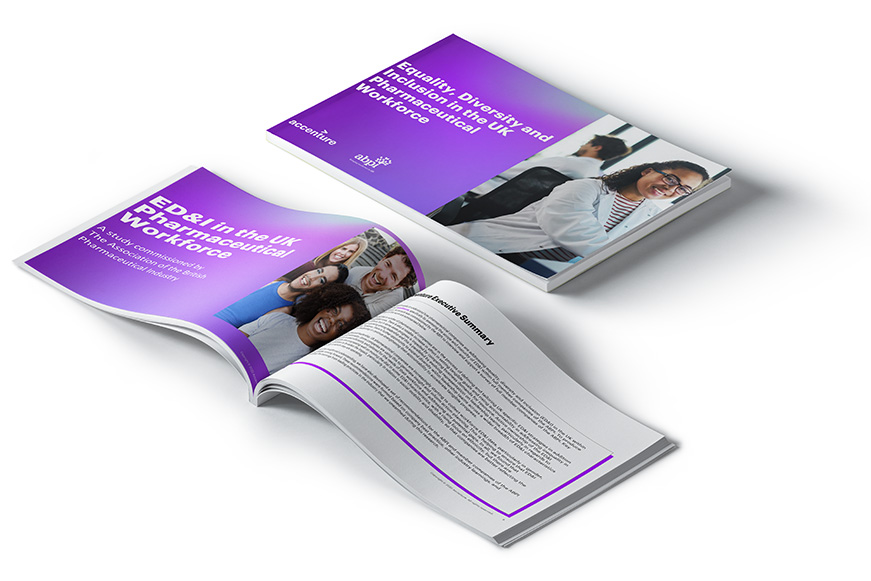Equality, Diversity and Inclusion in the UK Pharmaceutical Workforce
We commissioned Accenture to undertake a study to establish the maturity of ED&I across our full member companies and inform what ourselves as a Trade Association can do for our own maturity.
This report is the outcome of that work and is our inaugural study in response to our ED&I strategy.
The UK pharmaceutical industry is taking steps forward in its ED&I journey, showcasing some leading practices of progress
Key findings from the data suggest that companies have made a start, especially in vision and accountability, and there is room to go further

Accenture executive summary
This report seeks to understand how pharmaceutical companies are addressing equality, diversity and inclusion (ED&I) in the UK within their own workforces , specifically by assessing the scope and maturity of ED&I within full member companies of the ABPI. To produce this report, Accenture was commissioned by the ABPI to interview and support a survey of full member companies of the ABPI. Key findings of this work are summarised below.
We found that a number of pharmaceutical companies are in the process of defining and tailoring UK specific ED&I strategies in addition to their global ones. There is also a notable increase in effort in setting tangible goals and rising accountability in addressing inequality in the workforce, but in some cases progress is impeded by competing business demands for resource. Active ownership of the ED&I agenda is growing among leadership and this is paralleled by evolving representation on leadership teams, particularly in regards to gender. However, there is further opportunity to expand diversity within leadership teams across a gender. However, there is further opportunity to expand diversity within leadership teams across a wider breadth of ED&I characteristics and for leadership to continue strengthening their accountability to accelerate tangible progress.
Going beyond leadership, UK pharmaceutical companies are increasingly starting to collect workforce ED&I data, particularly in gender, age and nationality. Some companies are using this to generate insight and inform action planning. This is helping to ensure that ED&I resource is used efficiently and tailored for the needs of their workforce and addressing any potential gaps. In all, we found that companies are progressing well on moving the dial in some ED&I characteristics, with a rising focus on ethnicity, but there are opportunities to broaden the impact, particularly in relation to social mobility and disability, so that companies are better reflecting the society in which they are operating.
Using this insight and understanding, we have also developed a set of recommendations for the ABPI and member companies of the ABPI to consider moving forward. These recommendations were formed based on company best practice, other industry learnings, and distilling the learnings from leading practices in the industry that we unearthed during this research.
#1 Key finding
While ED&I strategies are solidifying, there is work to do on assigning ownership and communicating progress.
Observations:
- ED&I strategies are starting to take shape
- ED&I KPIs and metrics are embryonic for most
- ED&I progress is affected by a lack of focused UK resource
Calls to action:
- Define a UK specific ED&I strategy
- Enable tracking of ED&I success
- Inspire ED&I accountability across the organisation
- Build ED&I more formally into day to day operations


#2 Key finding
Leadership recognises the importance of ED&I, but there are opportunities to improve representation and accountability.
Observations:
- Leadership represents a narrow set of characteristics
- Leadership accountability exists but has room to grow
Calls to action:
- Keep ED&I at the forefront of business decision making
- Ensure diversity of thought when making decisions and setting strategy
- Empower a diverse future leadership pipeline
- Encourage leaders to be vulnerable in their own ED&I journeys
#3 Key finding
Data collection is rising but insight generation and action planning are still in their infancy.
Observations:
- ED&I data collection is in its early days
- Insight generation from ED&I data can be further maximised
Calls to action:
- Identify the business imperative and use case for collecting ED&I data
- Enrich quantitative data with qualitative data
- Assess your organisation’s capabilities for ED&I data collection
- Inspire and empower employees to self disclose


#4 Key finding
Companies are progressing well on some ED&I characteristics, but there are opportunities to broaden impact.
Observations:
- The changing face of diversity over the years
- The opportunity to increase impact and breadth
Calls to action:
- Assess your organisation’s progress on social mobility
- Inspire future talent from a broader range of backgrounds
- Identify sponsors or leaders with a personal connection to ED&I
- Plan for enabling employees with disabilities
Accenture conclusion
Our research shows that member companies of the ABPI are committed to driving change in relation to ED&I across their workforce and are early on in their journey. With a more mature ED&I vision, empowered by ED&I mindsets in your leadership, this is a journey where companies can make a real difference. Setting and communicating local goals and KPIs, supported by the right technology and programmes, can help address the obstacles pharmaceutical companies face when striving for an equal, diverse and inclusive workforce.
While many pharmaceutical companies are still in the process of defining a UK specific ED&I strategy, either by localising their existing global strategy or originating a local strategy based on the UK workforce’s needs, we are seeing a rising effort in setting tangible goals and holding the organisation accountable to addressing inequality in the workforce. Having dedicated ED&I resources can help push the dial forward. That said, there is also value in sharing the ED&I responsibility from HR to the business leaders, and then across the workforce. The next step is taking a strategic coordinated business effort, powered by data, to make sustained and impactful change. For this to properly take effect, it helps for the wider business to also understand the business value ED&I brings in decision making, innovation, talent attraction and retention, competitiveness and profit.
Leaders taking an authentic approach to understanding and addressing ED&I challenges in the workforce, by identifying and facing their own lack of knowledge on the topic and advocating for the value of ED&I in the workplace, can help to foster the cultural tone for the company.
Representation also matters, at all levels. It can contribute to a sense of belonging and true belief that an individual is valued by their employer for their unique contributions, perspectives and experiences. If not simply the right thing to do, it can also enable companies to differentiate as well as better understand the needs, barriers and opportunities of the customers and communities that the company serves.
The success of a culture of equality, diversity and inclusion will depend not only on the programmes and policies that are put in place, but the experience that they deliver. Culture is a living and growing thing and companies need to continually nurture, monitor, refine and grow it to achieve their objectives as well as meet evolving needs and changing contexts.
Equality, diversity and inclusion go hand in hand: true inclusion cannot be achieved if there is not diversity and equality, and similarly diversity is hard to obtain if equality is lacking and inclusion is not right. Change will not happen overnight, but intentional and sustained improvements will lead to big impact. The ABPI and its member companies, including the pharmaceutical industry more broadly, have a great opportunity to drive this change and create a lasting impact for generations to come.

Workforce Report
Download the report to access all the detailed facts, figures and insights.
Last modified: 25 October 2023
Last reviewed: 25 October 2023